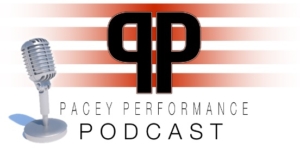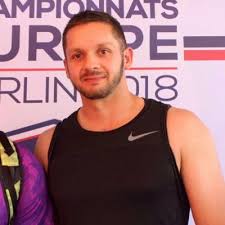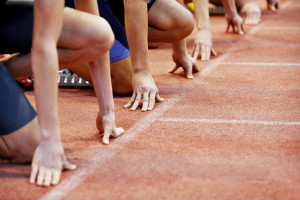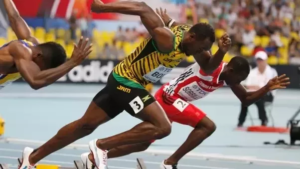This blog is a review of the Pacey Performance Podcast Episode 298 – PJ Vazel
PJ Vazel

YouTube Channel
Background:
PJ Vazel
PJ started as a sports journalist for the IAAF and began coaching in 2004 in the same year, coaching sprinters from Nigeria, Greece and France, Switzerland and Senegal. He has most recently been coaching in throwing at World championship and medal level since 2015 when he came back to France.
Discussion topics:
Where did that love of sports history come from?
”I like the search of origins. From a coaching perspective I had some ideas but I was not sure how to implement them, I was searching for what had been done before so not to replicate the mistakes and to go faster. I wanted to know how the technical and resistance training had evolved over the decades, including the rules and regulations.”
How did you first get into coaching?
”I was asked to help a young sprinter find a coach. I asked around and actually no one was willing to help him, so some people told me: ‘coach him, go ahead and start!
Working with a young Nigerian sprinter he had never had a coach, and I had never had an athlete, so it worked very well. He had no bad habits and we were discovering everything and eager to learn together. He was very motivated as every race he had was a way of living for him.
I was travelling with him and sleeping on the floor, but what I learned is that really you meet some athletes who have extra motivation and they are killers on the track and that’s the kind of people you are going to meet, and you have to prepare athletes for that!
Fortunately a huge part of sports history is the history of training methods so I kind of learned by accident the methodology of training so I integrated it. The most difficult thing was to gauge the volume of training and basically what I did was cut everything in half from what I was reading in the books. I kind of felt what he needed and the connection with the athlete. I needed to trust the athlete and observing him, listening to what he had to say because he had a lot of experience. Athletes use their body once or twice a day as their main work tool, so they know more more and as coaches we have to listen more to them.”
Do you think with your lack of experience you were more willing to listen to your athletes rather than thinking that you know best?
”Not really because we all start from scratch. The funny thing with my coaching debut was that I was still not fluent in English at all, so I had nothing much to say to them in English. I was just listening to them, and I think that was better because I think that as a young coach I thought I knew a lot. I think that if I had started with a French athlete I would have told them everything I knew, which I think is the wrong approach.
If I had something to say I was managing to tell them [in English] but the important thing I was saying was the only thing I was saying.
Because I was a young coach, others were not afraid to tell me their secrets. I remember going to every athlete/coach who made the final and asked, ‘are you doing weights, and if yes, what weights are you doing?’ I found that everyone who made the final were doing weights. I then went back to my athlete who was the first out of the semi-final: ‘look you are the only one who is not doing weights, and you are the only one who has not made the final, so maybe we need to do something different next year.”
How has the history of sprinting changed in the last twenty or so years?
”I believe that nothing much has changed in the last 20 years or so compared to perhaps the changes that took place in the earliest part of the 21st century and even up to after the war, where science and methods evolved every four years. In the last 20 years high tech technology yes but the concepts have not evolved.
Take ancient Greece, they weren’t very concerned about times and to record it because they didn’t have a way to measure it with accuracy. It was only in the late 18th century when we started to do sprint races where we could time it which influenced a lot the training methods of the 19th and 20th century.
Perhaps you could say there is more of a focus on High-intensity now, not only in sprinting but also in weight training and also in team sports. But it is a throw back to what was done in the early 20th century when athletes started to specialise in certain events (before they were all round athletes in the 19th century) and the physique was not that specialised either where the same person could win the short sprints and the long sprints. In the 20th century it was deemed that you were either born fast or for endurance, with certain psychological traits associated with those disciplines. This lead to the idea that in order to get fast you just needed to sprint, and don’t go against your nature. And I think we see this now, where you are told to sprint with high intensity and low volume, but that’s what they did back then in the early 20th century.
If you look at the results you get from this [specific] approach, you improve very fast in what you are doing because you are mostly doing the same thing but you reach a plateau very soon and you get tired, and you don’t improve anymore and you may even regress.
There are more efficient approaches utilising more general training in the winter because they could see they could improve over a longer time during winter and get ready for summer competitions. Because if you only sprint fast, within a few weeks you will plateau. This concept of variability was very well understood in the 1960s. Maybe now we are very focused on top speed and power, and finding out the exact power output you need to train.”
What about the introduction/use of strength training- what impact has weight training had on the sport? And did it go too far and perhaps become too important and now it has regressed?
”So in the 19th century athletes were lifting weights because they were also throwers, power lifters etc and doing all kinds of training. When sprinters started to specialise there was this idea that you needed to be light and doing weights you would get big, so weights are wrong.
Now you can still find sprinters doing weights just for conditioning using dumbbells throughout the centuries but what really changed was science tried to prove whether it was meaningful to lift weights or now, so in Eastern Europe a landmark study in 1946 was done, because everything even politics had to have a scientific justification.
They did a study comparing athletes who did weights and athletes who didn’t do weights, and looked at who is improving the most in terms of results. It was found that throwers and sprinters who added weights to their training had better results in competition in their main event.
However what was interesting, and a point that was lost in this research over the years, was that yes you need to do weights but it should not be at the expense of amplitude and relaxation of movement.
This advice got lost because when they started to quantify this type of training they noticed that the more you train the better the results, which is true. It is an observation that you cannot deny. But the experience of coaches in the field, showed them that there was a limit to this. But far from being unified the research was full of contradiction and controversies and the articles back then showed a big battle between coaches and scientists who disagreed over how much weights to do!”
Why has there been so much more focus on Maximum Power?
”If we think about weight training, they soon discovered that there was an optimal amount and they needed to improve maximum strength as well as speed so they started to record the bar speed, and jump height in the late 1950s as opposed to just the max squat strength (absolute strength).
The only concept that was not really important for the coaches in the 1950s that was not important then but is important now is the concept of max power. But back then the concept of variability of training meant that to improve your power you needed to improve your max strength and your speed-strength. But in between just focusing on that max power doesn’t make sense because you need variability.
Using a variation of power athletes in the 1950s were improving more than the athletes using the exact power of their specific event) which is the 7kg implement of the shot put. Only using the implement is less efficient than changing. Why? Because of variability. You are improving your technique because of the feeling of the muscles, small variations makes you a better skilled athlete. Also the best intensity is not always 100%- at 90-95% you can still work at a high enough intensity to be relevant to your nervous system but you can also do enough volume to get the repetition of practice needed. If you train 100% every time, you are crushing your nervous system, you can’t train at enough volume and you lose your relaxation!
Most elite athletes who have achieved their best throws will tell you, that it felt easy, and they felt they could have done more!”
What do you think about some of Frans Bosch’s ideas?
”He presented a lot of interesting exercises when I listened to him present. I think a lot of coaches focus more on the exercises rather than thinking about the philosophy and how to implement/progress them.
With instagram you now have athletes who will say to their coach, ‘I want to do this exercise.’ Usually the exercise is too advanced for the athlete and you have to explain to the athlete that there is a progression. I think that most of what Frans presents is far too difficult for the athletes, even elite athletes. Many athletes are great compensators and have developed crazy skills that hide great weaknesses. And those are the weaknesses you need to address, and sometimes those fancy and complicated exercises are not pointing the finger at the weak part of the chain.”

Top 5 Take Away Points:
- Importance of variability- you can improve for longer without crushing your nervous system
- Listen to your athletes- Athletes use their body once or twice a day as their main work tool, so they know more more and as coaches we have to listen more to them.
- Earn the right! Many athletes are great compensators and have developed crazy skills that hide great weaknesses. And those are the weaknesses you need to address, and sometimes those fancy and complicated exercises are not pointing the finger at the weak part of the chain
- Importance of relaxation- yes you need to do weights but it should not be at the expense of amplitude and relaxation of movement.
- Paradox of intensity- alternate days of high intensity with low intensity.
Want more info on the stuff we have spoken about? Be sure to visit:
Twitter:
@PJVazel
You may also like from PPP:
Episode 372 Jeremy Sheppard & Dana Agar Newman
Episode 367 Gareth Sandford
Episode 362 Matt Van Dyke
Episode 361 John Wagle
Episode 359 Damien Harper
Episode 348 Keith Barr
Episode 331 Danny Lum
Episode 297 Cam Jose
Episode 295 Jonas Dodoo
Episode 292 Loren Landow
Episode 286 Stu McMillan
Episode 272 Hakan Anderrson
Episode 227, 55 JB Morin
Episode 217, 51 Derek Evely
Episode 212 Boo Schexnayder
Episode 207, 3 Mike Young
Episode 204, 64 James Wild
Episode 192 Sprint Masterclass
Episode 183 Derek Hansen
Episode 175 Jason Hettler
Episode 87 Dan Pfaff
Episode 55 Jonas Dodoo
Episode 15 Carl Valle
Hope you have found this article useful.
Remember:
- If you’re not subscribed yet, click here to get free email updates, so we can stay in touch.
- Share this post using the buttons on the top and bottom of the post. As one of this blog’s first readers, I’m not just hoping you’ll tell your friends about it. I’m counting on it.
- Leave a comment, telling me where you’re struggling and how I can help
Since you’re here…
…we have a small favor to ask. APA aim to bring you compelling content from the world of sports science and coaching. We are devoted to making athletes fitter, faster and stronger so they can excel in sport. Please take a moment to share the articles on social media, engage the authors with questions and comments below, and link to articles when appropriate if you have a blog or participate on forums of related topics. — APA TEAM
=> Follow us on Facebook
=> Follow us on Instagram
=> Follow us on Twitter







